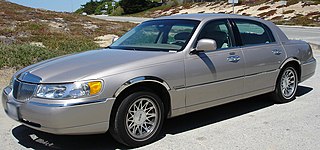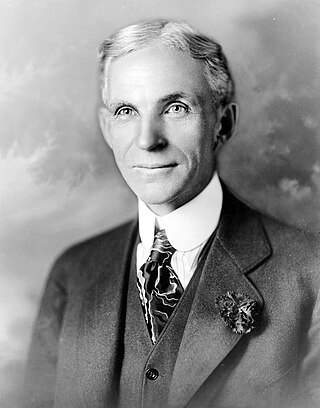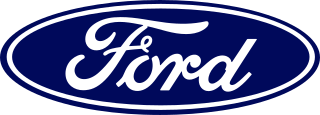
Lincoln Motor Company, or simply Lincoln, is the luxury vehicle division of American automobile manufacturer Ford Motor Company. Marketed among the top luxury vehicle brands in the United States, Lincoln is positioned closely against its General Motors counterpart Cadillac. However, beginning with the 2021 model year, they only offer SUV and crossover vehicles.

The Ford Taurus is an automobile manufactured and marketed by the Ford Motor Company in the United States for model years (MY) 1986-2019. Introduced in late 1985 for the MY 1986, six generations were produced over 34 years, with a hiatus for MY 2006-2007. For MY 1986-2009, Ford marketed the Taurus alongside its rebadged variant, the Mercury Sable; four generations of the high-performance Ford Taurus SHO were manufactured. The Taurus also served as the basis for the first-ever front-wheel-drive Lincoln Continental (1988–2002).

Mercury was a brand of mid-priced automobiles produced by American manufacturer Ford Motor Company between 1938 and 2011 with 1939 being the first model year. It stood as its own line within Ford until 1945, and thereafter formed half of Ford's Lincoln-Mercury Division. The brand was created by Edsel Ford in 1938 to bridge the gap between the Ford and Lincoln model lines.,

The Ford Crown Victoria is a full-size sedan that was marketed and manufactured by Ford. The successor to the Ford LTD Crown Victoria, two generations of the model line were produced from the 1992 until the 2012 model years. The Ford counterpart of the Mercury Grand Marquis, the Crown Victoria was the largest sedan marketed by Ford in North America, slotted above the Ford Taurus. The Crown Victoria Police Interceptor (1992–2011) was marketed specifically for law-enforcement use; a long-wheelbase Crown Victoria sedan (2002–2011) was marketed primarily for taxi cab fleets.

The Ford Explorer is a range of SUVs manufactured by Ford Motor Company since the 1991 model year. As the first four-door SUV produced by Ford, the Explorer was introduced as a replacement for the two-door Bronco II. Within the current Ford SUV range in North America, the Explorer is slotted between the Ford Edge and Ford Expedition. As with the Ford Ranger, the Explorer derives its name from a trim package previously offered on the Ford F-Series pickup trucks.

The Lincoln Town Car is a model line of full-size luxury sedans that was marketed by the Lincoln division of the American automaker Ford Motor Company. Deriving its name from a limousine body style, Lincoln marketed the Town Car from 1981 to 2011, with the nameplate previously serving as the flagship trim of the Lincoln Continental. Produced across three generations for thirty model years, the Town Car was marketed directly against luxury sedans from Cadillac and Chrysler.

The Ford Panther platform was an automobile platform that was used by Ford Motor Company from the 1979 to 2012 model years. Following the downsizing of the General Motors B-bodies and C-bodies by two years, the Panther platform marked the end of production of sedans unencumbered by downsizing. Originally slated for discontinuation during the early 1980s, the Panther architecture was used for 33 model years, making it one of the longest-produced platforms in North American automotive history.

William Clay Ford Jr. is an American businessman, serving as executive chair of Ford Motor Company. The great-grandson of company founder Henry Ford, Ford joined the board in 1988 and has served as chair since January 1999. Ford also served as the president, CEO, and COO until turning over those roles to former Boeing executive Alan Mulally in September 2006. Ford is also the vice chairman of the Detroit Lions NFL franchise. Ford serves as a chairman of the United States-Mexico Chamber of Commerce.

The Ford Wixom Assembly Plant was a Ford Motor Company manufacturing facility in Wixom, Michigan, with production reaching 6,648,806 over the fifty years it was operational (1957–2007).

The Lincoln MKZ, is a four-door, five-passenger mid-size luxury sedan manufactured by Ford and marketed as the Zephyr and as the MKZ by Ford's Lincoln brand across two generations in both gasoline and hybrid gas/electric models.

The Oakville Assembly Complex is a Ford Motor Company of Canada automobile factory in Oakville, Ontario, spanning 487 acres. This landmark occupies the same site as, and combines, the former Ontario Truck plant and Oakville Assembly Plant. Clearly visible from the Queen Elizabeth Way and the Lakeshore West GO Train line, it relies on the nearby railway service to transport parts and vehicles throughout the country.

The Continental Mark VI is a full-size luxury car that was produced by Ford Motor Company from 1980 to 1983. The fifth generation of the Mark series, the Continental Mark VI introduced several changes to the model line. Again marketed and serviced by the Lincoln-Mercury division, the Mark VI served as the flagship of the entire Ford Motor Company model line, slotted above the Lincoln Town Car.

Kansas City Assembly Plant (KCAP) is a Ford Motor Company automobile assembly facility which produces the Ford F-150 and the Ford Transit. It is located in Claycomo, Missouri, United States, about 10 miles (16 km) northeast of downtown Kansas City, Missouri. It consists of 4.7 million square feet (440,000 m2) of production space and employs approximately 9,468 hourly workers represented by the United Auto Workers Local 249. It is the largest car manufacturing plant in the United States in terms of vehicles produced.

St. Thomas Assembly was an automobile plant located in Southwold, Ontario, Canada, close to the Talbotville community and the nearby city of St. Thomas. The 2,600,000 sq ft (240,000 m2) facility, situated on a 635 acres (2.57 km2) site, opened in 1967, building the Ford Falcon. Flexible fuel vehicles (FFV) capable of operating on ethanol fuel were manufactured there during the later years of the assembly plant. Ford's plans for sustainability and reduction of fossil fuel consumption relied on the St. Thomas Plant and its Lincoln Town Car vehicles for years. It also produced the final Mercury vehicle, a Mercury Grand Marquis, after Ford decided to discontinue the Mercury brand after the 2011 model year.
Mahindra & Mahindra is an Indian automobile manufacturing company headquartered in Mumbai, Maharashtra. It was established in 1945 as Mahindra & Mohammed and later renamed Mahindra & Mahindra. Part of the Mahindra Group, M&M is one of the largest vehicle manufacturers by production in India. Its unit, Mahindra Tractors, is the largest manufacturer of tractors in the world by volume. It was ranked 17th on a list of top companies in India by Fortune India 500 in 2018. Its major competitors in the Indian vehicular market include Maruti Suzuki India and Tata Motors. Dr. Anish Shah is the current CEO and Managing Director of Mahindra & Mahindra.

The Ford Motor Company is an American automaker, the world's fifth largest based on worldwide vehicle sales. Based in Dearborn, Michigan, a suburb of Detroit, it was founded by Henry Ford on June 16, 1903. Ford Motor Company would go on to become one of the largest and most profitable companies in the world. The largest family-controlled company in the world, the Ford Motor Company has been in continuous family control for over 110 years. Ford now encompasses two brands: Ford and Lincoln. Ford once owned 5 other luxury brands: Volvo, Land Rover, Jaguar, Aston Martin, and Mercury. Over time, those brands were sold to other companies and Mercury was discontinued.

The Lincoln MKT is a full-size luxury crossover SUV with 3-row seating marketed by the Lincoln division of Ford Motor Company over a single generation from 2010-2019. Marketed between the Lincoln MKX and the Lincoln Navigator, the MKT shared its Ford D4 chassis with the Ford Flex CUV and the 2011-2019 Ford Explorer.

Ford India Private Limited was a subsidiary of Ford Motor Company for its operations in India. Ford India Private Limited's headquarter were located in Sholinganallur, Chennai, Tamil Nadu. Ford also had operated integrated manufacturing facilities in Sanand, Gujarat. On September 9, 2021, Ford exited the Indian market as it failed to keep up with the competition, and other global economic factors had led to reduction in demand. On 8 August 2022, Ford announced it would be selling its manufacturing plant in the western state of Gujarat for INR 7.26 billion to Tata Motors. Since 2021, Ford India has focused on the businesses of supporting a service network, import and distribution of automotive parts, and the sale of extended warranties.
Hermosillo Stamping and Assembly is a Ford Motor Company-owned automobile assembly facility located in Hermosillo, Sonora, Mexico. The facility currently assembles Ford Bronco Sport and Ford Maverick (2022) models for the North American market. The facility, which began production in 1986, employs 1,500 people and covers a floor space of approximately 1,500,000 sq ft (140,000 m2).

Ford Motor Company is an American multinational automobile manufacturer headquartered in Dearborn, Michigan, United States. It was founded by Henry Ford and incorporated on June 16, 1903. The company sells automobiles and commercial vehicles under the Ford brand, and luxury cars under its Lincoln brand. The company is listed on the New York Stock Exchange and is controlled by the Ford family. They have minority ownership but the majority of the voting power.

















